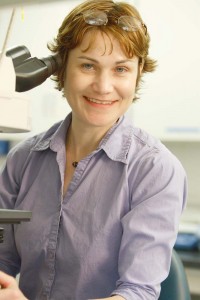Biology professor returns from mid-Atlantic ridge expedition
After nearly two months at sea, Katrina Edwards, a professor of biological and earth sciences, returned home Nov. 19 from a research expedition in the North Pond of the mid-Atlantic Ridge.

Returned · Katrina Edwards is a professor of biological and earth sciences at USC. - Photo courtesy of Katrina Edwards
Edwards traveled to the remote location to install three circulation obviation retrofit kits, which allow researchers to continuously observe marine life through a permanent tube on the sea floor.
“The installation of the CORKs observatories was challenging, because it’s such a complicated process,” Edwards said. “When you actually install it, it’s a marathon in terms of work. You basically are awake from the time you start and the time you complete the installation, and that can be anywhere from 24 to 48 hours.”
Working with 120 people aboard the Integrated Ocean Drilling Program’s flagship Joides Resolution, Edwards and co-chief scientist Wolfgang Bach of Bremen University in Germany, led the international team of researchers from more than a dozen nations.
The large and far-reaching endeavor establishes a spot for USC at the forefront of marine research, Edwards said.
“This expedition, both the international character of it and the riskiness of it, puts [USC] at the cutting edge of what the research world is today,” Edwards said. “It definitely puts us at the forefront of international leaders of world-class research. As we move toward a more global economy and global social structure, we are also moving to a more international research environment.”
In studying the microbiology of how life thrives beneath sub-seafloor sediments and rocks, the team had access to samples using cutting edge molecular and micro-biological techniques that have thus far eluded science, Edwards said.
“This was really our first opportunity to go out there and use all the modern tools and technologies we have to offer to address these kinds of questions,” Edwards said.
Though the expedition took six years of planning and the installation took two months, the project is far from over. Edwards and her colleagues will be collecting data from the North Pond CORKs for the next four to 10 years, drilling more than 4.5 kilometers deep for volcanic, igneous rock samples.
“Now, our real work begins,” Edwards said. “We had a great expedition, but mainly we only initiated the experiments, but now is when we actually have to do the experiments and analyze the samples.”
Edwards has received 10 boxes of samples from the Atlantic to analyze, the results from which will be eventually compiled with other collected data to form several publications. Until then, the samples will be kept safely frozen, awaiting analysis by researchers.
Edwards will present her initial results of the expedition to the American Geophysical Union meeting, the largest geophysical conference worldwide, next week.

Comments are closed.